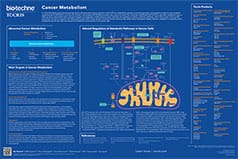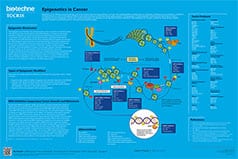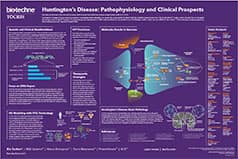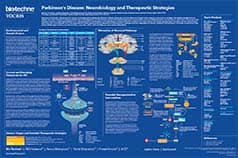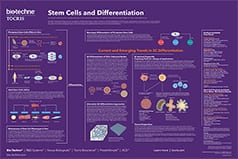Life Science Posters
A range of posters authored by leading experts
Authored by leading experts in the field, and summarizing key areas of research, the following range of life science posters provide a colorful and informative source of information. We invite you to request* or download your copy today.
*Please note that Tocris will only send literature to established scientific business / institute addresses.
Addiction
Mechanisms of Addiction
Prof David Nutt, Imperial College London
The key feature of drug addiction is the inability to stop using a drug despite clear evidence of harm. This poster describes the brain circuits associated with addiction, and provides an overview of the main classes of addictive drugs and the neurotransmitter systems that they target.
Allosteric GPCR Pharmacology
Arthur Christopoulos, David Thal, Denise Wootten and Patrick M. Sexton. Monash University
G protein-coupled receptors (GPCRs) are intrinsically allosteric proteins. This poster provides insights into allosteric mechanisms of GPCR biology, highlighting key facets of GPCR allostery and therapeutic applications of allosteric modulators.
Alzheimer's Disease
Alzheimer's Disease Neuropathology and Epidemiology
Dimitra Sokolova and Soyon Hong, University College London
Alzheimer's disease (AD) is a debilitating and progressive neurodegenerative disease and the most common cause of dementia, affecting approximately 30% of individuals aged over 85 years. This poster summarizes the cellular and molecular mechanisms of AD.
Autophagy
Autophagy: Mechanisms and Function
Patricia Boya, CSIC
Patrice Codogno, University Paris-Descartes
Autophagy is a cellular process used by cells for degradation and recycling. Written by Patricia Boya and Patrice Codogno, this poster summarizes the molecular machinery, physiology and pathology of autophagy. Compounds available from Tocris are listed.
Cancer Metabolism
This poster summarizes the main metabolic pathways in cancer cells and highlights potential targets for cancer therapeutics. Genetic changes and epigenetic modifications in cancer cells alter the regulation of cellular metabolic pathways providing potential cancer therapeutic targets.
Cell Cycle & DNA Damage Repair
In normal cells, each stage of the cell cycle is tightly regulated, however in cancer cells many genes and proteins that are involved in the regulation of the cell cycle are mutated or over expressed. This poster summarizes the stages of the cell cycle and DNA repair. It also highlights strategies for enhancing replicative stress in cancer cells to force mitotic catastrophe and cell death.
Depression
Antidepressants - Current and Future Targets
Phil Skolnick, National Institutes of Health
Piotr Popik, Jagiellonian University
Ramon Trullas, Consejo Superior de Investigaciones Científicas (CSIC)
Major depressive disorder is characterized by depressed mood and a loss of interest and/or pleasure. Updated in 2015 this poster highlights presynaptic and postsynaptic targets for the potential treatment of major depressive disorder, as well as outlining the pharmacology of currently approved antidepressant drugs.
Epigenetics in Cancer
This poster summarizes the main epigenetic targets in cancer. The dysregulation of epigenetic modifications has been shown to result in oncogenesis and cancer progression. Unlike genetic mutations, epigenetic alterations are considered to be reversible and thus make promising therapeutic targets.
GPCR Efficacy and Biased Agonism
Patrick M. Sexton, Arthur Christopoulos and Denise Wootten, Monash University and Fudan University
GPCRs can interact with multiple distinct transducers or regulatory proteins and these can be preferentially engaged in an agonist-specific manner giving rise to biased agonism. This poster discusses cutting edge GPCR signaling pharmacology and highlights therapeutic applications of biased agonism.
Gut Hormones
Gut Hormones and Metabolism
Rebeccca Scott and Stephen R. Bloom, Imperial College London
The gastrointestinal tract is the largest endocrine gland in the human body, secreting hormones that affect digestion, appetite and energy expenditure. Neuropeptide modulators and gut hormones that influence appetite are reviewed in this poster.
Huntington's Disease
Huntington's Disease: Pathophysiology and Clinical Prospects
Nina Stöberl and Nicholas Allen, University of Cardiff
Huntington's disease (HD) is a severe monogenic neurodegenerative disorder, which is characterized by the prevalent loss of GABAergic medium spiny neurons (MSN) in the striatum. This poster summarizes the effects of mutant huntingtin aggregation implicated in the pathology of HD, as well as highlighting the use of iPSCs for HD modeling.
Multiple Sclerosis
Multiple Sclerosis: from Neurobiology to Therapy
Alastair Wilkins and Richard Ibitoye
Multiple sclerosis (MS) is an autoimmune disease that is characterized by focal demyelination and axon degeneration in the central nervous system. This poster summarizes the neurobiology and current therapies of MS.
Parkinson's Disease
Parkinson's Disease: Neurobiology and Therapeutic Strategies
Anthony H.V. Schapira, University College London
Parkinson's disease (PD) causes chronic disability and is the second most common neurodegenerative condition. This poster outlines the neurobiology of the disease, as well as highlighting current therapeutic treatments for symptomatic PD, and emerging therapeutic strategies to delay PD onset and progression.
Programmed Cell Death
Apoptosis, Necroptosis and Cell Survival
Bram van Raam, Universiteit Gent
Guy Salvesen, Sanford-Burnham Medical Research Institute
There are two currently recognized forms of programmed cell death: apoptosis and necroptosis. This poster summarizes the signaling pathways involved in apoptosis, necroptosis and cell survival following death receptor activation, and highlights the influence of the molecular switch, cFLIP, on cell fate.
Rheumatoid Arthritis
Epigenetic Drug Targets
Adam P. Cribbs, Marc Feldmann and Udo Oppermann, University of Oxford
Rheumatoid arthritis (RA) is a chronic destructive inflammatory autoimmune disease that results from a breakdown in immune tolerance, for reasons that are as yet unknown. This poster summarizes the pathology of RA and the inflammatory processes involved, as well as describing some of the epigenetic modifications associated with the disease and the potential for targeting these changes in the discovery of new treatments.
Stem Cell Workflow
Using Small Molecules
Stem cells have potential as a source of cells and tissues for research and treatment of disease. This poster summarizes some key protocols demonstrating the use of small molecules across the stem cell workflow, from reprogramming, through self-renewal, storage and differentiation to verification. Advantages of using small molecules are also highlighted.
Stem Cells
Stem Cells and Differentiation
Rebecca Quelch and Stefan Przyborski
Written by Rebecca Quelch and Stefan Przyborski from Durham University (UK), this poster describes the isolation of pluripotent stem cells, their maintenance in culture, differentiation, and the generation and potential uses of organoids.





